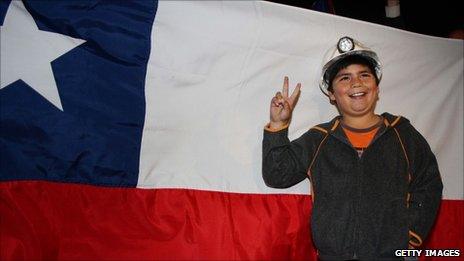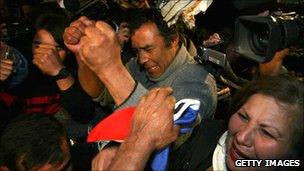Miners' rescue will inspire Pinera's administration
- Published

Chileans celebrated in the streets after the rescue
As the 69-day mission to rescue the 33 Chilean miners drew to a close, President Sebastian Pinera told the BBC that the operation showed that Chile was a united country.
"I hope from now on when people around the world hear the word Chile, they will not remember the coup d'etat or the dictatorship, they will remember what we've done - all the Chileans together," he said.
For many Chileans, this is an appealing prospect.
"They used to say Chile was Pinochet and [deposed President Salvador] Allende and earthquake - now they'll say it's the San Jose mine," says writer Roberto Ampuero, after hearing the message President Barack Obama sent to the miners and seeing that CNN's Larry King decided, for only the second time in his career, to host two shows on the same subject on the same day.
Big ambition
But for the economist Sebastian Edwards, a new image will require more than just a desire for change.
"The coup was a process that saw continuity in Pinochet's dictatorship and the human rights abuses committed during that regime.
"The big lesson is that it is necessary to make the most of the opportunity presented by the rescue - ensure that the virtues shown by Chile have continuity," the University of California, Los Angeles, professor told La Tercera.
Mr Pinera's ambitions should not come as a surprise, given that during his election campaign he promised that if he were to win, he would strive to take Chile out of the ranks of developing countries.
Chile's President Sebastian Pinera says the rescue has 'united Chile'
The centre-right president became closely involved with the rescue mission against the advice of his aides, who believed it was highly likely it would have a fatal outcome.
For some of his advisers, the most prudent thing to do was to highlight the failures of the mine's owners and the centre-left coalition that had ruled Chile for two decades up until March 2010.
Recent Labour Ministry figures show that on average, 34 people a year died in mining accidents between 2000 and 2009. But before the collapse of the San Jose mine, there was little awareness of accidents in the industry, which accounts for more than 10% of the country's GDP.
So when on 5 August, it emerged that 33 people were buried more than 600 metres under the Atacama desert, the government decided to take action and Mr Pinera pledged that he would spend whatever was needed to bring the 33 men out alive.
The first 17 days were the hardest for the Pinera administration - and not only because as the hours passed the chances of finding the men alive diminished. While officials and rescuers were working hard to make contact with the miners, in the south of the country the government was facing problems from indigenous Mapuches.
Thirty-four Mapuches detained for violent acts that were considered terrorism, went on hunger strike. There were fears that some of them would die.

The story of the miners has touched people across the globe
The country was also preparing to mark 200 years of independence from Spain, and the former president Michelle Bachelet declared that there was nothing to celebrate.
The government itself began to talk of "commemoration" rather than "celebration" and declared events to mark the bicentenary should be sober.
Things are now looking much better for the Pinera government: the hunger strike ended a fortnight ago after concessions to Mapuche groups and the 33 miners are out.
Political event
When the thirty-third miner emerged from the mine, Mr Pinera gave a speech in which he said that from now on, "hecho a la Chilena" - made Chilean-style - would mean "well made".
The miners' rescue will, it appears, be the inspiration for his administration.
On Saturday, Mr Pinera is due to start a tour of the UK, France and Germany with an agenda that has been changed because of the mine rescue.
It is likely that he will be accompanied by one of the rescuers and will visit a German factory that contributed to the rescue mission. He will also attend a Manchester United football match to discuss the invitation extended by the club to the trapped miners.
The successful rescue of the 33 miners has gone beyond being a humanitarian event. It has become a political event that serves as a building block for a government that wishes to transform Chile into a developed nation.